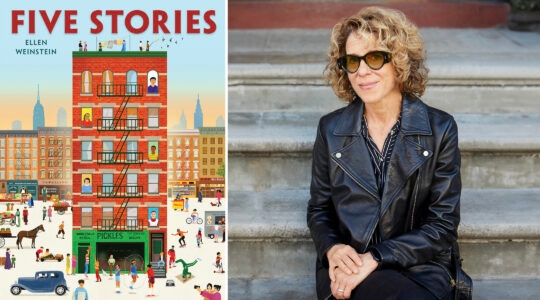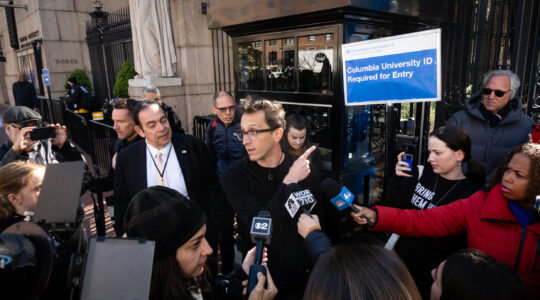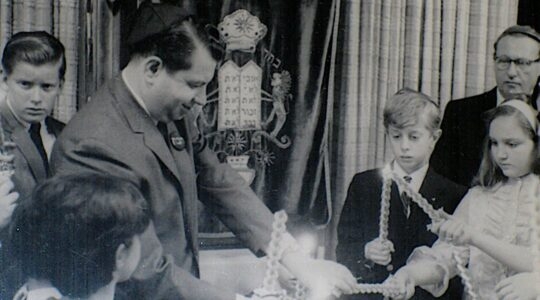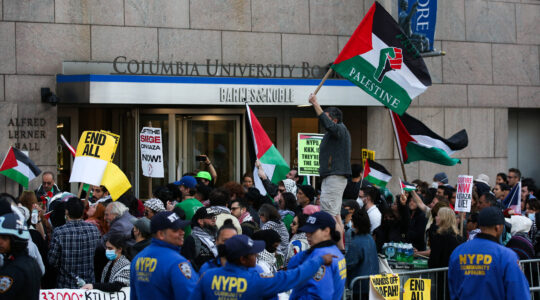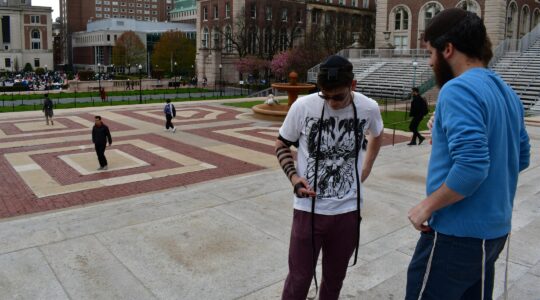The sound is unmistakable and unique. It is, as Charlette Shulamit Ottolenghi observes, neither Ashkenazi nor Sephardic. It is entirely its own, even if the words are millennia old.
“It’s absolutely Italian,” Ottolenghi says, her eyes glittering playfully behind the light flashing off her glasses. “It’s completely different. You can recognize the flavor of the Italian classical tradition; it’s embedded in that tradition. But the influences run both ways.”
The sound of Italian-Jewish liturgical music is the sound that Ottolenghi was raised on. It’s the sound that she thrives on and concertizes with. In both her recent CD on the Amiata label (amiatamedia.com), “Italia Ebraica,” and in her various concert programs, that sound takes center stage. Ottolenghi will be making a rare New York appearance on April 10 with a program in honor of the 70th anniversary of the Warsaw Ghetto uprising and even there, amid selections written by women during the Shoah, she will include some appropriate examples of the tradition that gave her musical birth.
“A Song for Life,” as the program is titled, is a concert that Ottolenghi has been performing for years in Italy, where she was raised, in Israel, where she has lived since she was 18, and across Europe. With the exception of the Italian-Jewish liturgical songs that she includes, the material on the program is entirely the product of women who were imprisoned in the camps and ghettos.
“I think of it more as a ‘voice for life,’” Ottolenghi says in a Skype interview. “During the Shoah, there was an enormous amount of music produced, but these songs particularly took my heart. They are very simple, somewhere between folk song and ‘art’ song. There are many lullabies, songs of longing, songs of protest, but to me the overarching theme is that women could compose in such a situation. … I wanted to give them a voice, a voice for life. Nothing is higher to express living than creating and the fact that they could compose in the camps is like a miracle to me.”
Her personal connection to the Warsaw Ghetto is indirect, she explains: “My mother came from England and her family had been there for a couple of generations, my father had fled to Switzerland (at the beginning of the war), having bought a visa from an Italian soldier.”
She pauses and laughs, then says, “The Swiss were happy to take in Italian deserters, but not Jews.”
But if the connection to the material wasn’t personal it was, nevertheless, intense.
“Someone came to me [to ask her to perform a Shoah-themed program] and I thought, music is my medium — this is something I can do to be able to touch the pain and atrocity,” she explains. “It has nothing to do with ‘commemoration’; it’s something so completely alive, a victory of life. When you are singing true and alive art, you are contradicting what the Shoah meant to do.”
The result was an almost therapeutic experience, which is surprisingly apt, because Ottolenghi is a trained clinical psychologist for whom singing has been an unlikely second career.
“I was already 40 when I gave my first concert,” she says. “I started singing for the Italian embassy in Israel, Neapolitan folk songs, Italian love songs and then the Italian hazanut [cantorial singing] that I fell in love with as a child in Milan. I gave my first concert in the Bible Museum. I felt like I was in the right place. Turning to music was a kind of closure for me.”
It was, she readily acknowledges, an improbable turn of events.
Support the New York Jewish Week
Our nonprofit newsroom depends on readers like you. Make a donation now to support independent Jewish journalism in New York.
“I tell you the truth, there are some fantasies so deep that you don’t even tell yourself about them,” she says. “I didn’t dare admit I wanted to sing. The first time I sang as an adult was to my own therapist. One day in therapy I stood up and sang ‘Sometimes I Feel Like a Motherless Child,’ and when I opened my eyes, my therapist was crying. After that I was a singer.”
A singer with a mission — to keep the Italian-Jewish musical tradition alive for another generation.
“After the Shoah, an enormous part of this super-rich tradition is disappearing,” she says. “I perform it mostly for non-Jews, but religious people can always relate to it, whatever their faith.”
Charlette Shulamit Ottolenghi will perform “A Song for Life,” accompanied by pianist Shai Bachar and special guest Frank London, on Wednesday, April 10, 7 p.m. at the Museum of Jewish Heritage (36 Battery Place). For more information on the event, which is presented by the Primo Levi Center and the Museum, call (6460 437-4202 or go to www.mjhnyc.org.
